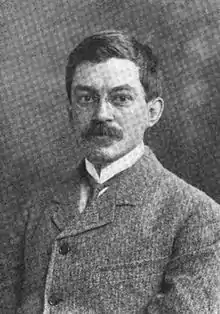Harold Jacoby
Harold Jacoby (4 March 1865 – 20 July 1932) was an American astronomer, born in New York City.[1]
Harold Jacoby | |
|---|---|
 | |
| Born | March 4, 1865 |
| Died | July 20, 1932 (aged 67) |
| Nationality | American |
| Alma mater | Columbia University |
| Occupation | Astronomer |
Career overview
Jacoby received his B.A. from Columbia College in 1885 and his Ph.D. from Columbia in 1895.[2] He applied himself to astronomical research, and was appointed assistant astronomer for the United States eclipse expedition to West Africa (1889–90).
He became professor of astronomy at Columbia University in 1894, and chaired the department until shortly before his death. Columbia's Rutherfurd Observatory was started during his tenure, with a twelve-inch Clarke refractor telescope and a transit instrument emplaced atop Pupin Hall.
Jacoby made many observations of celestial events such as lunar and solar eclipses. He was well known in Europe and America, and was a member of a large number of scientific groups. He published Practical Talks by an Astronomer (1891, 1902), Astronomy: A Popular Handbook (1913)[3][4] and Navigation (1917).
Notes
- Eckert, Wallace J. (1932). "Harold Jacoby, 1865 – 1932". Popular Astronomy. 40: 611–612. Bibcode:1932PA.....40..611E.
- "Lessons from a Campus Landmark | Columbia College Today". www.college.columbia.edu. Retrieved 2022-02-16.
- Short, Jessie M. (1915). "Review: Astronomy, A Popular Handbook, by Harold Jacoby". Astrophysical Journal. 41: 252. Bibcode:1915ApJ....41..252S. doi:10.1086/142169.
- Williams, K. P. (1914). "Review: Astronomy, A Popular Handbook, by Harold Jacoby". Bull. Amer. Math. Soc. 21 (3): 145–148. doi:10.1090/s0002-9904-1914-02617-5.
References
- Rines, George Edwin, ed. (1920). . Encyclopedia Americana.
External links
- Works by Harold Jacoby at Project Gutenberg
- Works by Harold Jacoby at Faded Page (Canada)
- Works by or about Harold Jacoby at Internet Archive
- Works by Harold Jacoby at LibriVox (public domain audiobooks)

- Charles Augustus Young; George C. Comstock; Robert S. Ball, Camille Flammarion; Harold Jacoby. Five weeks' study of astronomy. 1901 OCLC 1045547147